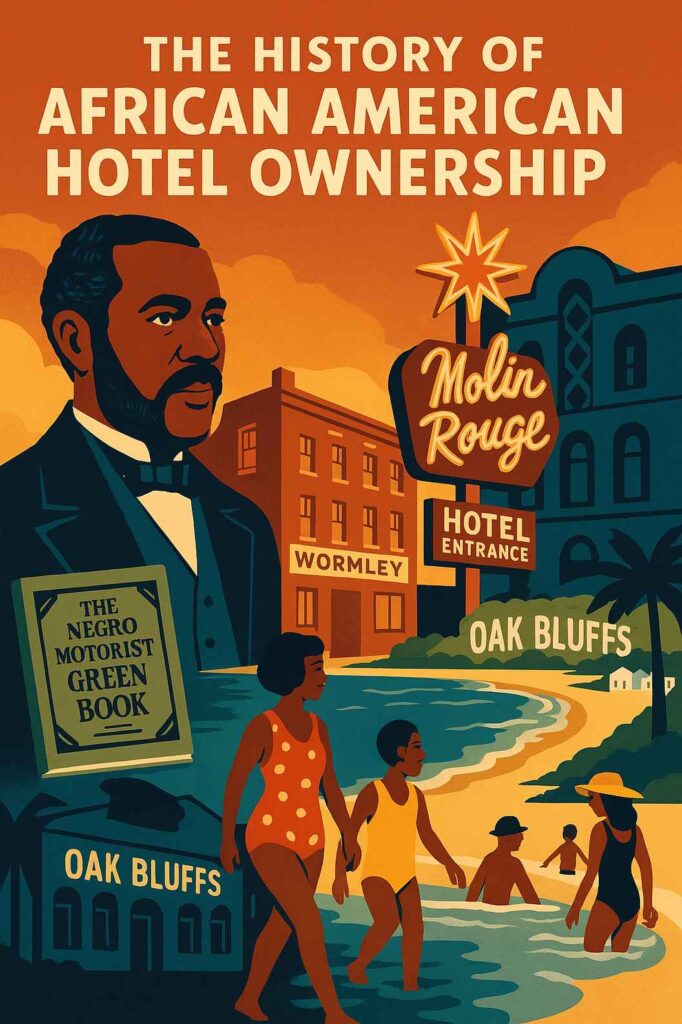
Pioneering Black Hoteliers: A Legacy of Resilience and Excellence
Long before the mainstream hospitality industry opened its doors to Black travelers—or welcomed Black ownership—African descendants across the diaspora were carving out spaces of dignity, enterprise, and excellence. From the visionary James Wormley, who opened the luxurious Wormley Hotel in Washington, D.C. during Reconstruction, to bold entrepreneurs who built hotels during the height of Jim Crow segregation, Black hoteliers have played a vital role in shaping global hospitality history.
One of the earliest known figures in this legacy is Rachael Pringle Polgreen, a formerly enslaved woman who, in the late 18th century, owned and operated the Royal Navy Hotel in Bridgetown, Barbados. Polgreen’s establishment catered to British naval officers and high-profile guests—including the future King William IV—making her one of the first women of color to operate a hotel-tavern in the Caribbean. Her business acumen propelled her to considerable wealth, and her story reflects both the opportunities and contradictions of Black entrepreneurship in the colonial era.
Another pivotal figure is Tunis G. Campbell, a pioneering African American hotel steward and political leader in 19th-century America. During his time in New York City from the 1830s to 1845, Campbell rose to become principal steward of prominent hotels and boarding houses. In 1848, he authored Hotel Keepers, Head Waiters, and Housekeepers’ Guide, widely considered the first guidebook on hotel management published in the United States. Campbell would later become a Reconstruction-era politician and justice of the peace in Georgia, where he continued to fight for Black civil and economic rights. His work in hospitality laid foundational standards for professionalism, dignity, and excellence in service.
Against the backdrop of exclusion and racial discrimination, these trailblazers founded and operated welcoming havens for Black travelers—offering safety, community, and sophistication. Their efforts expanded further during the Great Migration, as a new wave of Black-owned accommodations emerged to meet the needs of a growing, mobile Black middle class. The significance of these establishments was immortalized in The Negro Motorist Green Book, a powerful guidebook that helped generations of Black families navigate the American road while staying safe and supported.
These stories are more than milestones—they are monuments to perseverance, vision, and cultural pride.
Explore the lives and legacies of these pioneering hoteliers in the profiles that follow.
Early Black Hospitality Trailblazers
Rachael Pringle Polgreen
Born into slavery around 1753, she became the first woman of color to own a tavern-hotel, the Royal Navy Hotel in Bridgetown, Barbados, during the late 18th century. Polgreen established the Royal Navy Hotel in Bridgetown, a bold enterprise that served as both a hotel and a brothel catering to British naval officers and other affluent patrons. Her establishment became renowned, attracting high-profile guests, including Prince William Henry, the future King William IV. Polgreen’s business acumen and strategic alliances propelled her to prominence, making her one of the first women of color to own such an establishment in Barbados. By the time of her death on July 23, 1791, Polgreen had amassed considerable wealth, including ownership of multiple properties and at least 19 slaves. In her will, written just two days before her passing, she granted freedom to six of her enslaved individuals, while others were bequeathed to those she had freed. The Royal Navy Hotel remained standing until it was burned down in 1821.
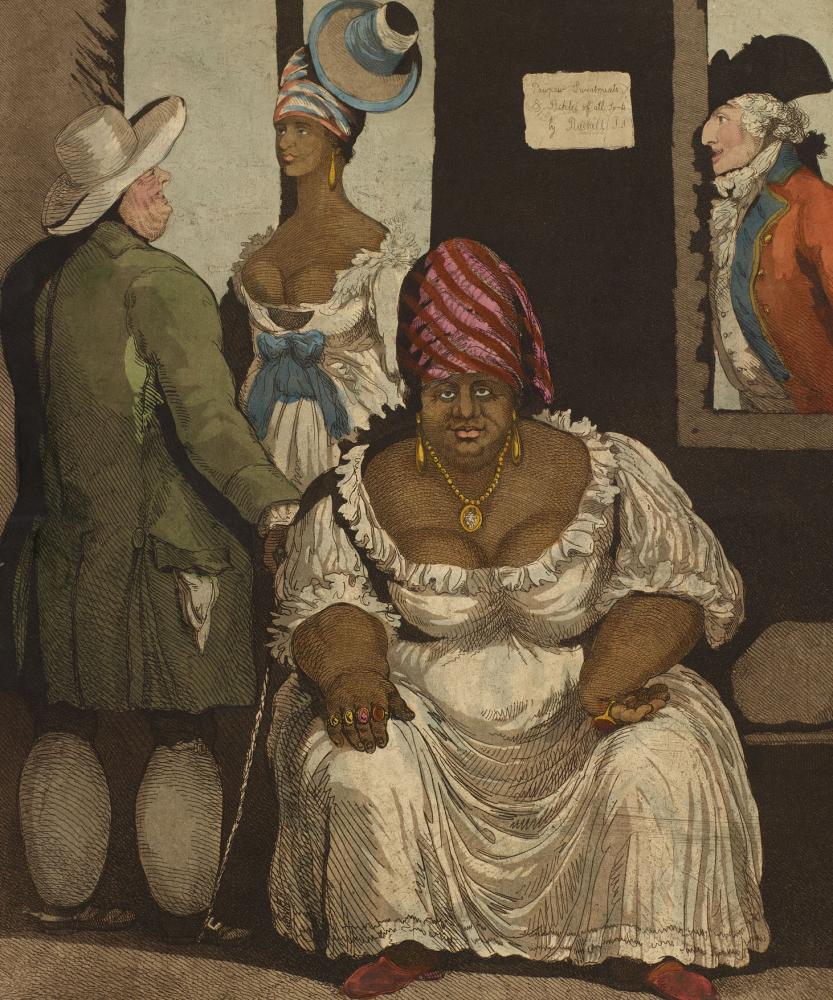
Tunis G. Campbell: Pioneer of Black Hospitality and Political Leadership
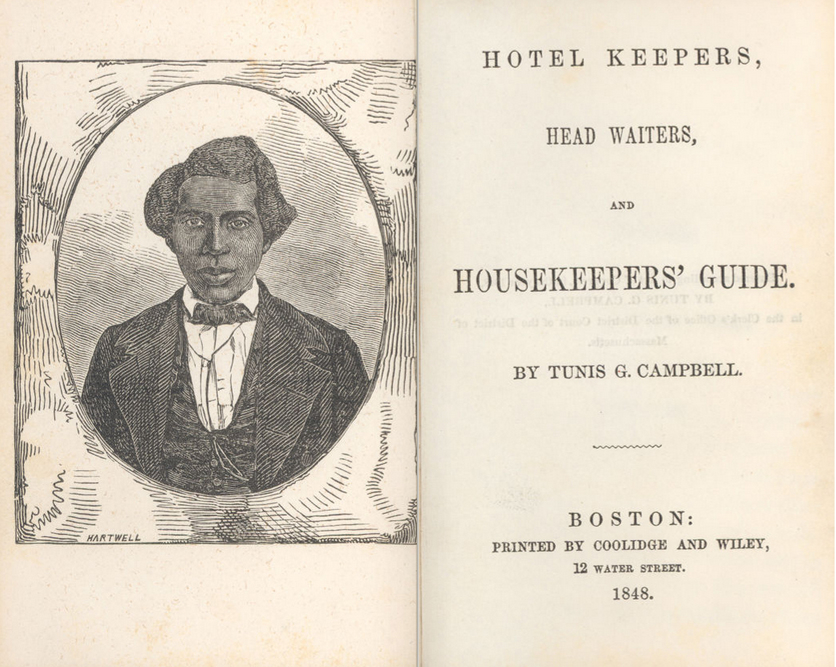
Tunis Gulic Campbell (1812–1891) was a trailblazing African American figure whose contributions spanned hospitality, education, and politics. Born free in Middlebrook, New Jersey, Campbell was one of ten children in a family led by his father, John Campbell, a blacksmith. At the age of five, he was enrolled in an all-white Episcopal school in Babylon, New York, where he received an education that was rare for African Americans at the time.
Innovator in Hotel Management
Between 1832 and 1845, Campbell honed his skills in the hospitality industry in New York City, culminating in his role as the principal waiter at the Howard Hotel. There, he developed a systematic approach to dining service, emphasizing efficiency and elegance. In 1848, he published Hotel Keepers, Head Waiters, and Housekeepers’ Guide, the first book of its kind in America. This manual detailed his innovative methods, including a system of signals for waitstaff to coordinate service seamlessly. Initially met with skepticism, his techniques eventually gained recognition, with testimonials from hotel proprietors attesting to their effectiveness. MSU Libraries Digital Repository
Champion for African American Advancement
Beyond hospitality, Campbell was deeply committed to uplifting African Americans. He established schools for Black children in New York and New Jersey and was active in the abolitionist movement. During the Civil War, he was commissioned to assist freed slaves in South Carolina and later played a pivotal role in resettling freed Black residents on Georgia’s Sea Islands.
In the Reconstruction era, Campbell emerged as a significant political leader in Georgia. He served as a voter registration organizer, Justice of the Peace, delegate to the Georgia Constitutional Convention of 1867–1868, and as a Georgia state senator. His efforts were instrumental in advocating for the rights and welfare of African Americans during a tumultuous period in American history .
Legacy and Recognition
Campbell’s multifaceted contributions have left an indelible mark on American history. In recognition of his achievements, the Georgia Historical Society unveiled a historical marker in Darien, Georgia, in June 2024, honoring his life and political career .
Tunis Gulic Campbell was a free African American who became a political leader, educator, and hotel operator. Before the Civil War, he managed hotels in the North, including in New Jersey and New York. In 1848, he authored a hotel management guide, making him one of the first African Americans to document hospitality operations in print. His post-war leadership in Georgia also included community building and property development, embodying early Black excellence in hospitality and governance. On Rev. Tunis Gulic Campbell Sr., called “the oldest and best known clergyman in the African Methodist Church”, served as a voter registration organizer, Justice of the Peace, a delegate to the Georgia Constitutional Convention of 1867–1868, and as a Georgia state senator during the Reconstruction era-Wikipedia. On June 20, 2024, the Georgia Historical Society (GHS) unveiled a new historical marker about Tunis G. Campbell (1812-1891) in Darien in partnership with the Lower Altamaha Historical Society and the City of Darien. The marker details Campbell’s life and political career, including how he became one of the highest-ranking, most influential African-American politicians in 19th-century Georgia.
James Wormley: The First African American Hotelier
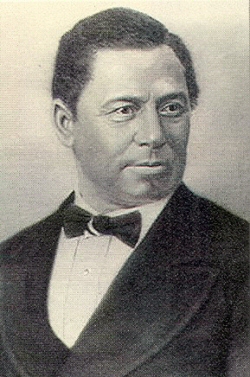
James Wormley is widely regarded as the first African American hotel owner in U.S. history. In 1869, he opened The Wormley Hotel in Washington, D.C., a five-story hotel and restaurant on the southwest corner of 15th and H Streets NW, strategically catering to government officials and politicians. The hotel gained prominence as the site of the historic Wormley Agreement, a political deal that influenced the end of Reconstruction. The Wormley family operated the hotel at 1500 H Street until the 1890s when it changed ownership and was eventually renamed. Wormley was known for his business acumen and gained a reputation for high-quality service at his hotel. Beyond his hotel business, Wormley was active in the Washington D.C community, including campaigning for funding for the city’s first public schools for African Americans.
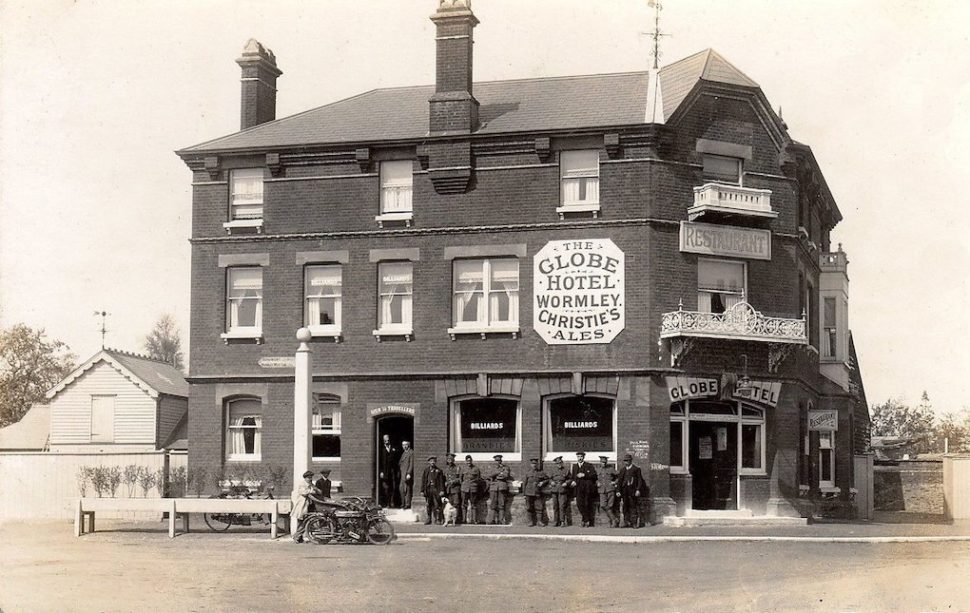
The Jim Crow Era and the Rise of Black-Owned Hotels
During the Jim Crow era, African American travelers faced discrimination across the country. The ruling in Plessy v. Ferguson (1896) reinforced the doctrine of “separate but equal,” but in reality, Black Americans were denied access to quality accommodations. Most downtown hotels prohibited African Americans, regardless of their economic status or location. For instance, the iconic Hotel Theresa in Harlem, New York, did not welcome Black guests until 1940—nearly three decades after opening.
These systemic exclusions led to the rise of Black entrepreneurship in the hospitality industry. African American hoteliers established first-class accommodations that provided a dignified travel experience for Black travelers. These establishments served as safe havens where Black guests could enjoy world-class hospitality without discrimination.
The Great Migration and the Expansion of Black Hospitality
Between the early 1900s and the 1960s, the Great Migration saw over six million African Americans move from the rural South to urban centers in the North, Midwest, and West. This migration created new opportunities for Black-owned hotels, especially in areas with growing Black populations. Businesses flourished in cities like Chicago, Detroit, and New York, where Black travelers sought more opportunities for a better life.
The Negro Motorist Green Book
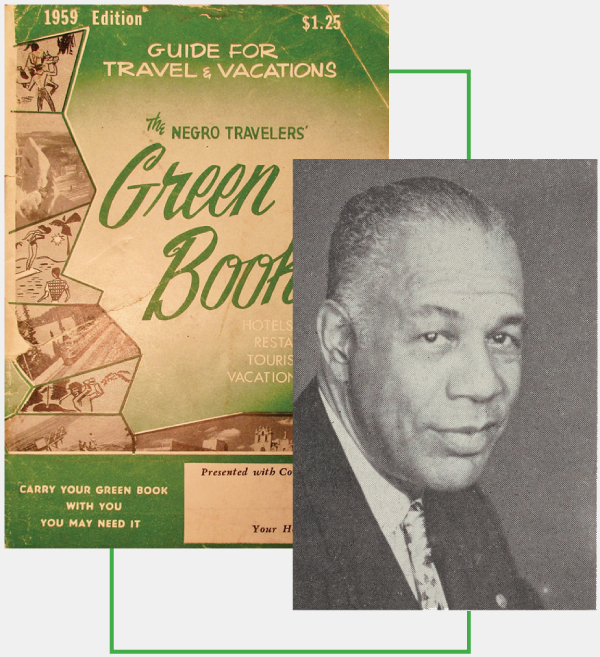
How one man’s guidebook helped Black Americans navigate America’s Jim Crow roads—and continues to inspire today’s global inclusion efforts. In the 1930s, the promise of America’s open road was, for Black travelers, shadowed by the threat of discrimination, harassment, and even violence. Racial segregation laws—known as Jim Crow—varied from state to state, and few businesses welcomed African Americans with open arms. “Sundown towns” barred Black visitors after dark; hotels, restaurants, gas stations, and restrooms often refused them entry. What should have been simple rest stops could become dangerous dead ends. Learn more about The Negro Motorist Green Book.
Notable Black-Owned Resorts and Beaches: Preserving a Legacy of Leisure, Resistance, and Community
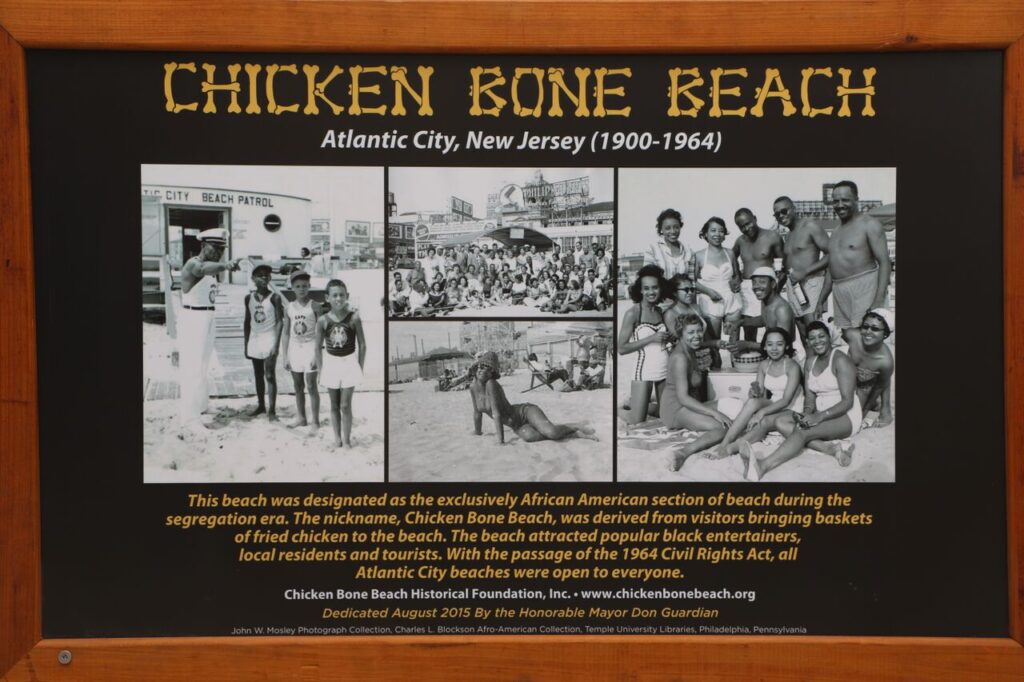
Long before mainstream resorts and hotels welcomed Black travelers, African Americans built their own havens—coastal escapes and cultural landmarks that offered more than just rest and recreation. These Black-owned and Black-frequented destinations created space for dignity, joy, and community during an era of segregation and systemic exclusion. From the tranquil shores of Highland Beach, Maryland, founded by the descendants of Frederick Douglass, to the historic elegance of Oak Bluffs on Martha’s Vineyard, these retreats are timeless symbols of Black enterprise, freedom, and pride.
Also central to this legacy is The Moulin Rouge Hotel and Casino, which opened in 1955 as the first integrated casino in Las Vegas. Partly owned by the legendary boxer Joe Louis, the Moulin Rouge stood as a radical statement of inclusion, attracting top Black entertainers like Sammy Davis Jr., Lena Horne, and Nat King Cole, and welcoming guests of all races under one roof—a revolutionary act in a segregated city.
Iconic seaside spaces like Bruce’s Beach (California), Virginia Key Beach (Miami), Chicken Bone Beach (Atlantic City), and Atlantic Beach, South Carolina—affectionately known as “The Black Pearl”—offered not only summer fun, but vital refuge for Black families and communities. Whether founded in defiance of Jim Crow laws or passed down through generations, these destinations served as gathering places, economic strongholds, and enduring sources of Black cultural expression.
Today, these storied locations are being reclaimed, restored, and celebrated for their powerful role in shaping the Black travel experience. Whether you’re looking to explore heritage-rich beach towns or visit trailblazing hospitality landmarks like the Moulin Rouge, these destinations invite you to honor the past while enjoying the beauty of Black excellence in leisure.
Explore the stories behind these remarkable destinations in the Notable Black-Owned Resorts and Beaches section below.
Highland Beach, MD
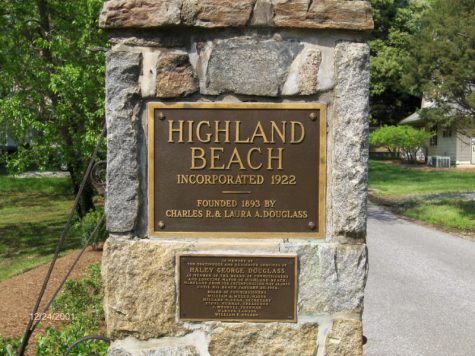
Considered the first African American resort town in the U.S., Highland Beach was founded in 1893 by Charles Douglass, the son of abolitionist Frederick Douglass. Charles and his wife, Laura, were inspired to create the community after being denied entry to a restaurant at the Bay Ridge Resort due to their race. Charles purchased beachfront property and sold lots to friends and family. In 1922, Highland Beach became the first African American municipality in Maryland. The town was a destination for affluent Black families, including notable figures like Judge Robert Terrell, Mary Terrell, Booker T. Washington, and Langston Hughes. Today, Highland Beach is home to both summer and year-round residents, and the Twin Oaks house, which now serves as the Frederick Douglass Museum and Cultural Center, preserves its history. Visit our Frederick Douglass Museum and Cultural Center Page to learn more about the cultural richness of a the Highland Beach community founded by and for African Americans at the turn of the 20th century.
Welcome to Oak Bluffs — a place where Black history meets coastal beauty.
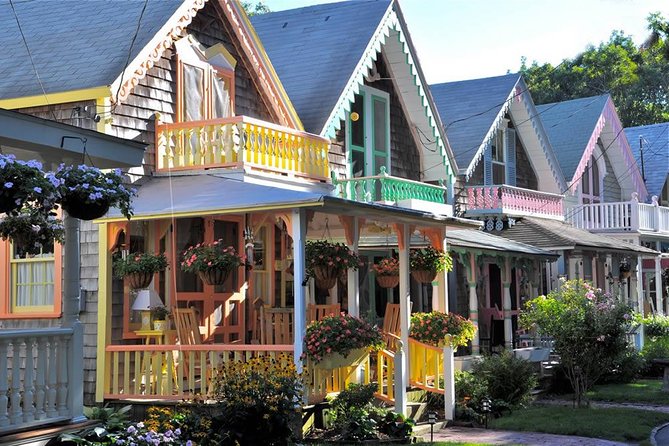
Nestled on the northeastern edge of Martha’s Vineyard, Oak Bluffs has long been a treasured summer sanctuary for African American families, leaders, and artists. From the days of segregation to the modern era, it has offered refuge, ownership, and joy — most famously through its iconic Inkwell Beach. This is more than a destination; it’s a living symbol of resilience, heritage, and community. Whether you’re walking past charming gingerbread cottages or attending a cultural event on the waterfront, Oak Bluffs invites you to relax, reconnect, and remember. Read more about Oak Bluffs
Virginia Key Beach Park, Miami, FL — A Legacy of Resilience and Recreation.
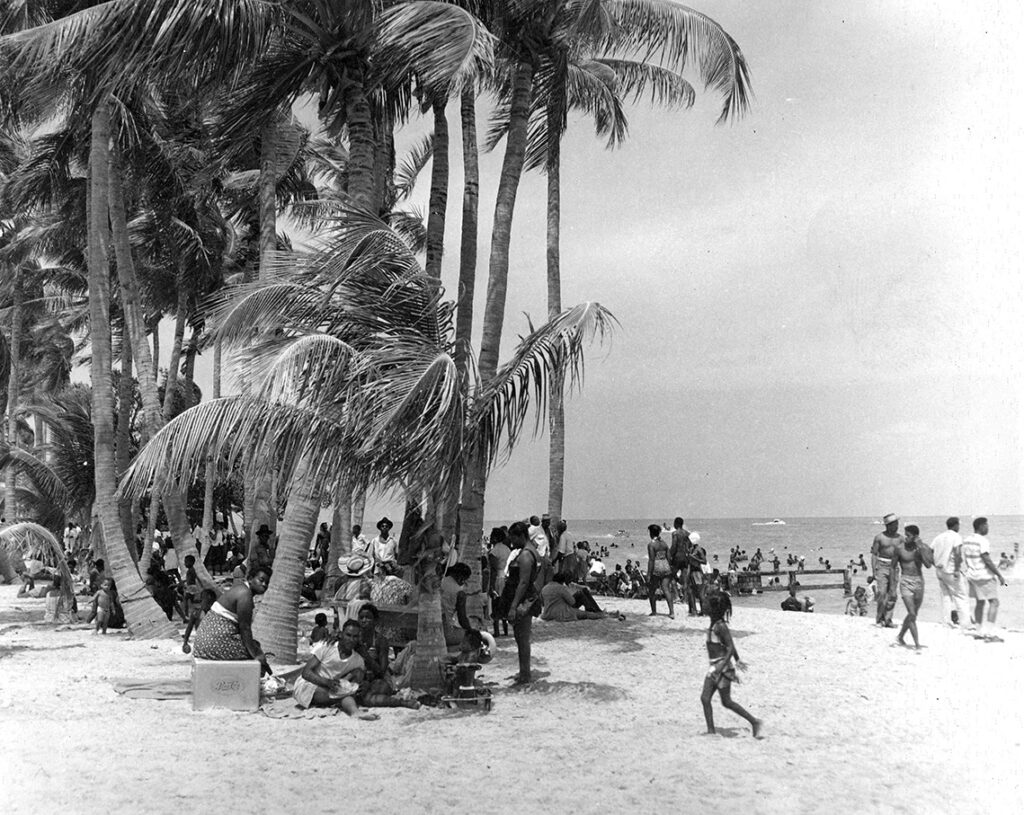
Tucked away on the tranquil shores of Biscayne Bay, Virginia Key Beach Park is more than just a scenic stretch of sand—it’s a living monument to the fight for equality, dignity, and safe spaces for Miami’s Black community during the era of segregation. Established in 1945 as Miami’s “colored only” beach, this vibrant site became a beloved gathering place for generations of African Americans who were barred from other public beaches.
From its early days as a sanctuary for sun, surf, and celebration, Virginia Key Beach evolved into a cultural landmark that hosted church picnics, family reunions, concerts, and civil rights events. Activists and community leaders rallied here, carving out joy and justice under the South Florida sun. Today, its historic carousel house, bathhouse, and picnic shelters remain powerful reminders of both struggle and triumph. Learn more about Virginia Beach Bark.
Bruce’s Beach (Manhattan Beach, CA)
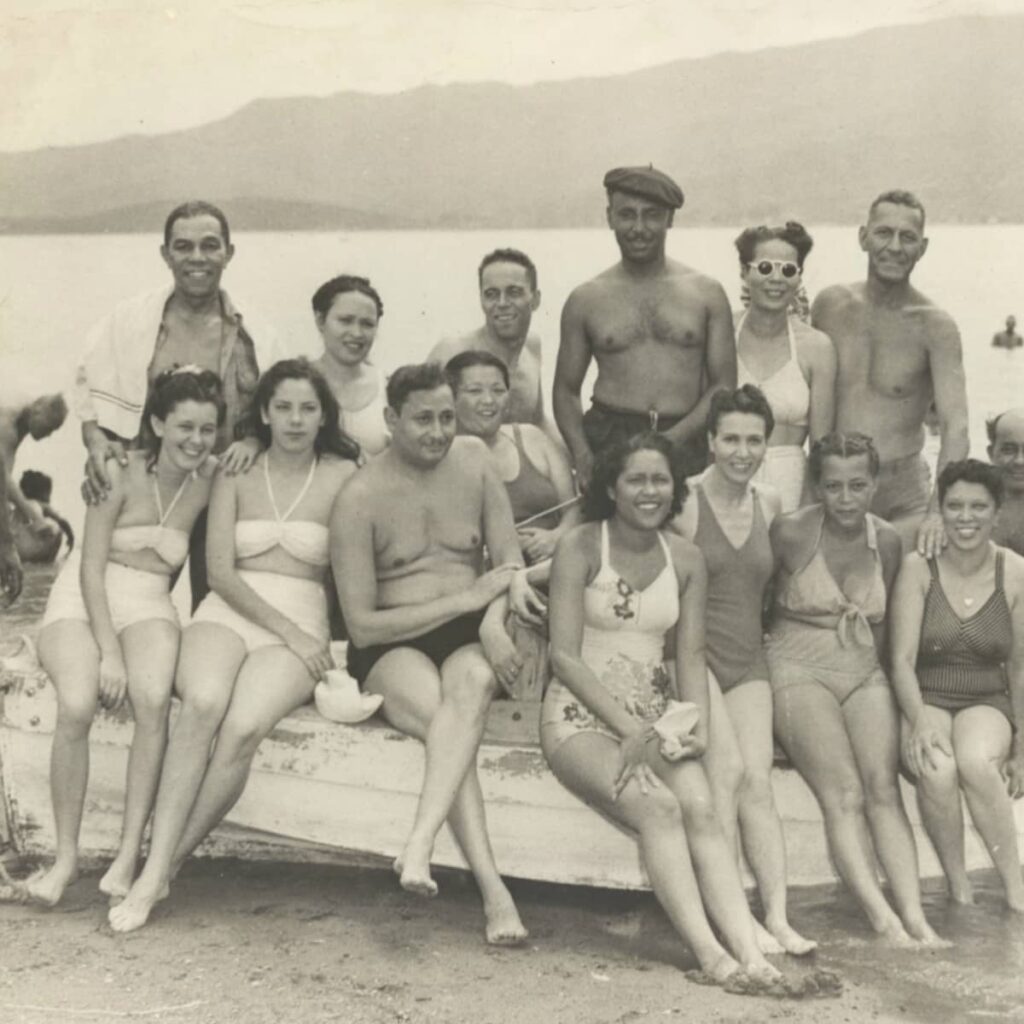
A rare recreational space for Black families in the early 20th century, Bruce’s Beach was established in 1912 by Willa and Charles Bruce. The couple purchased land in Manhattan Beach and created a resort that welcomed Black beachgoers, featuring a lodge, café, and dance hall. Wealthy land developer George H. Peck also sold plots to African Americans in the area. However, in 1924, Manhattan Beach city officials condemned the land through eminent domain under the pretense of building a public park. The resort was demolished in 1927, and the land sat empty for decades. In 2021, legislation was signed to return the property to the Bruce family heirs. Today, Bruce’s Beach is a public beach that travelers can visit in Southern California.
Chicken Bone Beach (Atlantic City, NJ)

This segregated beach, officially known as Missouri Avenue Beach, was a haven for Black vacationers from the early 1900s until the 1960s. The name “Chicken Bone Beach” originated from the many African American families and vacationers who brought fried chicken in picnic baskets to the segregated beach in Atlantic City, New Jersey. After enjoying their meals, they would often bury the chicken bones in the sand, leading to the informal name. Despite its segregation-era origins, Chicken Bone Beach became a cultural hub, attracting legendary Black entertainers and musicians like Sammy Davis Jr. and Louis Jordan. Today, a memorial plaque honors its historical significance.
Atlantic Beach, SC (“The Black Pearl”)
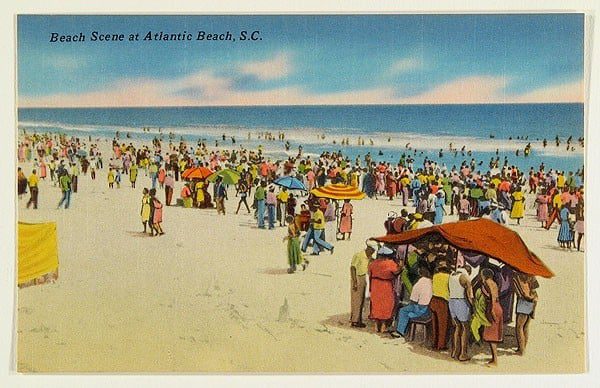
Established in the 1930s, Atlantic Beach was a flourishing vacation spot for Black families. Black entrepreneurs built hotels, restaurants, nightclubs, and shops, creating a self-sustaining community. In its prime, the area hosted Black entertainers like Ray Charles and Billie Holiday, who performed there after playing segregated venues in Myrtle Beach. Today, Atlantic Beach remains the only Black-owned beachfront town in the U.S., preserving its historical legacy through cultural events and new Black-led investments. Read more about Atlantic Beach
The Moulin Rouge: Breaking Barriers in Las Vegas Hospitality
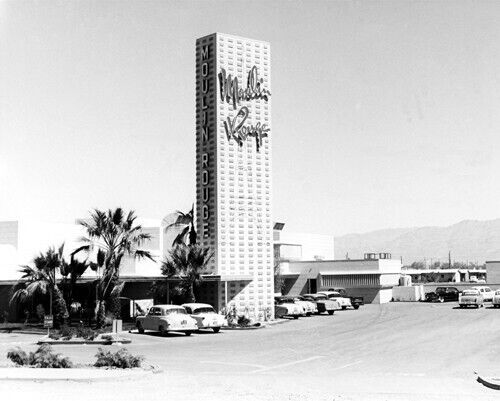
Opened in 1955, the Moulin Rouge Hotel & Casino holds a groundbreaking place in Black hotel history as Las Vegas’ first integrated casino and hotel. In an era when racial segregation was deeply entrenched—earning Las Vegas the grim nickname “the Mississippi of the West”—the Moulin Rouge boldly defied the status quo by welcoming guests and entertainers of all races.
Before the Moulin Rouge, world-famous Black performers like Nat King Cole, Lena Horne, and Sammy Davis Jr. regularly sold out shows on the Strip—but were barred from staying at or even entering the very hotels where they performed. These discriminatory practices, common in Las Vegas well into the 1950s, led to the rise of a parallel Black entertainment and hospitality scene, with Westside Las Vegas becoming a haven for African American tourists, business owners, and artists.
Located in the historic Westside neighborhood, the Moulin Rouge was partly owned by boxing legend Joe Louis, whose fame and activism lent the venture visibility and legitimacy. The casino was more than a hospitality business—it was a social movement in action. With racially integrated staff, performers, and guests, the hotel attracted a dynamic and diverse crowd, particularly for its now-legendary late-night revue, “Moulin Rouge Nights.”
In addition to top-tier entertainment and elegant accommodations, the Moulin Rouge made national headlines for hosting a 1955 meeting between city leaders and the NAACP, which played a direct role in the desegregation of Las Vegas casinos. Though it operated for only a few months due to financial difficulties, the Moulin Rouge’s cultural and civil rights legacy remains monumental.
The Moulin Rouge wasn’t just a hotel—it was a revolutionary space that challenged segregation and paved the way for inclusive hospitality in Las Vegas and beyond. Today, it stands as a proud symbol of Black entrepreneurship, resilience, and excellence in the travel and entertainment industries.
Modern Era: Breaking New Ground
Davonne Reaves & Jessica Myers

Black hotel ownership continues to grow, with African American entrepreneurs and investors making significant strides in the hospitality industry. One such example is the groundbreaking achievement of Myers and Reaves, two young African American women who co-own a Home2 Suites by Hilton in El Reno, Oklahoma. Their investment in the $8.3 million deal marks a milestone for millennial Black women in hotel ownership.
Contemporary Movers & Shakers in the Hospitality Industry
RLJ Lodging Trust: A Black-Owned Hospitality Powerhouse

Founded in 2011, RLJ Lodging Trust is a Black-owned hotel investment firm that owns a diverse portfolio of premium-branded hotels, including Marriott, Hilton, Hyatt, and Wyndham properties. With nearly 100 hotels across 23 states and the District of Columbia, RLJ Lodging Trust exemplifies the power of Black business success in the hospitality industry. In 2017 the Company completed one of the most defining mergers to ever occur in the hospitality industry—the acquisition of FelCor Lodging Trust; the $2.7 billion all-stock transaction was named Merger & Acquisition of the Year in the Americas Lodging Investment summer awards for 2017. It was the first time two publicly traded hospitality real estate investment trusts (REITs) merged, and it immediately positioned RLJ to become the third-largest hospitality REIT in the United States.
Warren Fields: Trailblazing CEO Leading a Global Hospitality Legacy

Warren Fields is the President and Chief Executive Officer of Pyramid Global Hospitality, a powerhouse in the hotel management and ownership space. Under his visionary leadership, Pyramid has grown from just three hotels at its founding in 1999 to a global portfolio of over 230 properties across the U.S., Caribbean, and Europe. His bold strategic direction has helped redefine what success looks like in the hospitality industry.
Before stepping into the CEO role, Warren served as Chief Investment Officer, playing a pivotal role in the company’s acquisitions, strategic growth, and business development. His deep understanding of hospitality investments and market dynamics has made him one of the most respected executives in the field.
As one of the few African-American leaders at the helm of a major international hotel group, Fields is a powerful example of excellence, resilience, and representation. His leadership not only influences global trends in travel and hospitality—but also serves as inspiration for the next generation of Black hoteliers and entrepreneurs.
Black-Owned Hilton Hotel: How Reaves and Myers Made Hospitality History

Davonne Reaves and Jessica Myers became the youngest African American women to co-own a property under a major hotel chain when they acquired the Home2 Suites by Hilton in El Reno, Oklahoma, for $8.3 million. They formed Epiq Collective and partnered with Nassau Investments to make the deal. At 33 years old, they achieved this milestone in 2020, according to Black Business News. Book a room at Home2 Suites in El Reno, Oklahoma today!
The Digital Age of Black Travel: Platforms Leading the Way
Travel Noire
Travel Noire is a digital media company that serves millennials of the African Diaspora, offering inspired content to help discerning travelers discover, plan, and experience new destinations. Founded in 2013 by Zim Ugochukwu, the platform has become a trusted resource for Black travelers seeking culturally relevant travel information. In 2017, Travel Noire was acquired by Blavity Inc., expanding its reach and influence within the travel industry.
Travel Noire’s offerings include travel guides, news, and lifestyle content that highlight destinations and experiences from a Black perspective. The company also provides tools and resources to assist travelers in planning their journeys, ensuring they have access to information that resonates with their cultural experiences. For more information, visit Travel Noire.
Green Book Global
Green Book Global was founded in 2015 by Lawrence Phillips. After leaving his decade-long career as an IT consultant, Phillips embarked on a transformative journey across over 30 countries and all seven continents. During his travels, he recognized the lack of resources addressing the unique concerns of Black travelers, particularly regarding safety and cultural acceptance in various destinations. This realization inspired him to create Green Book Global, a platform dedicated to empowering Black travelers with reliable, community-sourced insights.
Green Book Global stands as the first and only Black travel review site and app, offering users the ability to read and write destination reviews, book trips, and earn rewards. The platform emphasizes user-generated content that reflects the experiences of Black travelers, focusing on aspects like safety, inclusivity, and cultural relevance. By providing this tailored information, Green Book Global aims to make travel more accessible and enjoyable for the Black community. For more information, visit Green Book Global.
From Royal Roots to Modern Pioneers: A Legacy of Black Hotel Ownership
The history of Black hotel ownership stretches across centuries and continents, from Caribbean entrepreneurship in the 18th century to today’s trailblazing real estate investors and travel innovators. Despite centuries of exclusion, segregation, and systemic barriers, Black entrepreneurs have consistently carved out space in the hospitality industry—building hotels, founding resort towns, and shaping travel culture for generations of African American and global Black travelers.
This powerful timeline traces key milestones in Black hotel ownership—from Rachael Pringle Polgreen’s Royal Navy Hotel in 1770s Barbados to the revolutionary impact of Victor Green’s Negro Motorist Green Book, to the multimillion-dollar acquisitions led by women like Davonne Reaves and Jessica Myers in the 2020s. These moments represent more than entrepreneurial success—they tell a story of resilience, community-building, and cultural pride within an industry that hasn’t always opened its doors equally.
Whether through beachfront resorts, urban retreats, or digital platforms that reimagine what travel looks like for the African Diaspora, Black hotel ownership continues to redefine hospitality—rooted in legacy, driven by purpose, and powered by vision.
Timeline: Key Milestones in Black Hotel Ownership
- 1770s-1780s: Rachael Pringle Polgreen establishes the Royal Navy Hotel in Barbados.
- 1848: Tunis Gulic Campbell publishes the first U.S. guidebook on hotel management.
- 1869: James Wormley opens The Wormley Hotel in Washington, D.C.
- 1893: Charles Douglass founds Highland Beach, MD, the first African American resort town.
- 1912: Bruce’s Beach is established in California by Willa and Charles Bruce.
- 1913: Hotel Theresa opens in Harlem but does not welcome Black guests until 1940.
- 2015: Green Book Global was founded in 2015 by Lawrence Phillips.
- 1936: In 1936, Victor Green self-published the inaugural edition of The Negro Motorist Green Book.
- 1955: Moulin Rouge opens in Las Vegas
- 1930s-1970s: Atlantic Beach, SC, thrives as a premier Black-owned vacation destination.
- 1960s: The Civil Rights Movement leads to the desegregation of public accommodations.
- 2011: RLJ Lodging Trust is founded, becoming a major Black-owned hotel investment company.
- 2013: Travel Noire was founded by Zim Ugochukwu a digital media company that serves millennials of the African Diaspora.
- 2017: RLJ became the third-largest hospitality REIT in the United States.
- 2020s: Myers and Reaves become the youngest African American women to co-own a major hotel chain property.
Conclusion
The history of African American hotel ownership is one of perseverance, innovation, and excellence. From the pioneering efforts of James Wormley and Rachael Pringle Polgreen to modern Black-owned hospitality enterprises like RLJ Lodging Trust, African Americans continue to shape and redefine the travel industry. Today, Black hoteliers and entrepreneurs are breaking barriers and building generational wealth while preserving the legacy of Black excellence in hospitality. barriers and building generational wealth while preserving the legacy of Black excellence in hospitality.
As we celebrate these achievements, it is essential to support Black-owned hotels, resorts, and hospitality businesses, ensuring that the industry reflects diversity, inclusion, and the rich heritage of African American entrepreneurship.

